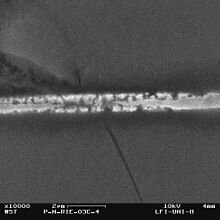More heat != runs hotter.
Running hot shortens lifespans (we are talking hot here, though. Not 80c), producing heat does not.
not entirely correct again.
you trying to distinguish between running at a hot temp,
and producing a lot of heat, but dissipates into cooling solutions.
Both heat and producing heat can kill a chip, one more than the other.
What is Producing heat?
heat is produced by electric resistance when it meets Voltage and current.
Too high of a voltage can generate electron saturation that kills a chip outright regardless if you run it at 10K (that's 10 Kelvin.)
You are saying the producing heat doesn't kill a chip. really?
coz last I checked super conductivity not yet availible for modern chips yet. where you read it?
Similarly producing heat despite being able to cool it, will cause degradation, in time.
It is a function of both Voltage, Time and Temp.
Producing too much heat (despite being able to cool), and having a chip exposed to hot temp, will both cause degrading on chips.
